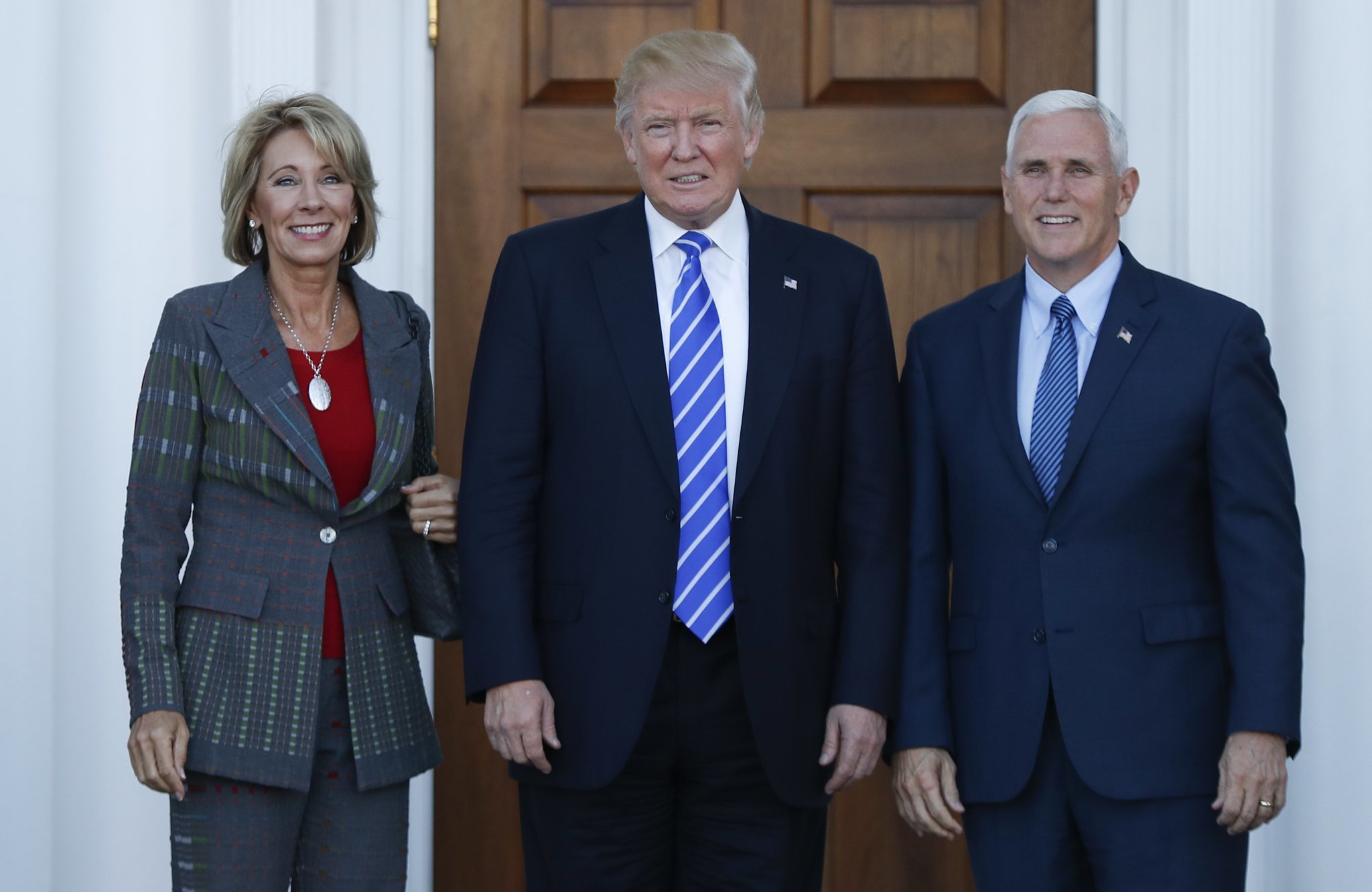Betsy DaVos’ Troubling Opinions on IDEA
You know what they say: If you can’t do, teach; and if you’ve never taught in a public school, get appointed as the secretary of education.
By Eric McInnis, Arcadia University
With a new administration in the White House, the United States has a new secretary of education.
The person Donald Trump has picked for the job is none other than education activist Betsy DeVos. Much like many of the other new members of the presidential cabinet, DeVos has been hit with heavy scrutiny, namely due to her past advocating for school choice and charter schools, a position that makes her appear more interested in the privatization of public education.
However, one particularly interesting statement she made during her confirmation hearing was her stance on the Individuals with Disabilities Education Act. IDEA, as written by the American Psychological Association, “ensures that all children with disabilities are entitled to a free appropriate public education to meet their unique needs and prepare them for further education, employment and independent living.”
When DeVos was questioned by Senator Tim Kaine about whether she believed all schools that receive federal funding should meet IDEA’s requirements, she responded, “I think that’s an issue that’s best left to the states.”

Besides DeVos apparently having had no idea beforehand that IDEA was a federal civil rights law, one of the most disheartening things she said was that she believed the funding and support of IDEA was not an important, federal issue, but rather something for the states to decide. Though it might seem odd to harp on such a small section, I think Ms. DeVos needs some perspective about IDEA and its importance from someone who has benefited from the program since kindergarten.
After being diagnosed with Asperger’s Syndrome, I had to be enrolled in a different school than my siblings, as my needs required an institution with a strong autistic-support classroom to help kids with neurodevelopment disorders. While I knew why I was there at the time, hearing DeVos’ opinions on IDEA the other day was when I first began to realize just how important the classes I took really were.
Growing up with a disorder that created humongous difficulties in terms of social interactions, understanding nonverbal communication and handling stressful situations, the types of classes and instructors I had were necessary for understanding other people and the world. Without the types of benefits I received, I would be unable to handle any sort of stressful situation, or have any sort of quality social skills today. And, seeing as civilization, society and health in general thrive on social interaction, having autistic-support classes available at school was the most helpful addition possible for my life.
Before going any further, one must remember that disabled students are going to be safe.
IDEA isn’t going to be taken away by DeVos or Congress. While the new secretary of education’s commitment to IDEA is up for debate, the program is still a federal law, one unlikely to be overturned any time soon, let alone during Donald Trump’s presidency. However, DeVos saying that disability rights and benefits in federally-funded schools, which include the private and charter schools she champions so much, is an issue the state should focus on rather than her, is sad and indicative of a grave misunderstanding about basic education.
While saying DeVos is an ableist is quite the stretch, as she doesn’t seem to be malicious toward the handicapped, the autistic, the blind or the deaf, she does show a sense of ignorance about the issues the disabled go through, which is rather alarming.
While many may disagree with the following statement, the most important cog in the machine of society, the law and the American Dream is quality education. Statistics from both the Bureau of Labor Statistics and the Bureau of Justice Statistics reflect this, as wage-earners who lack a high school diploma make significantly less money than people with higher education; in addition, a majority of prisoners have not attained a high school diploma.
Not only are there startling correlations between disability and poverty, as well as disability and discrimination, there’s of course the obvious fact that the disabled need far more attention than the rest of the able-bodied and neuro-typical world. They need to be treated with respect from their non-disabled peers, and they need to be given an educational environment that welcomes them, despite spite the issues they are forced to deal with.
Without these benefits, many disabled kids would end up unhappy and surrounded in a world that doesn’t seem care about them.
If you were to play devil’s advocate, you might mention DeVos’ letter to Senator Johnny Isakson, who is a member of the Health, Education, Labor and Pensions Committee. And while there is plenty of good in her letter, as she wants to enforce the ideas of IDEA, such as strengthening of student IEPs, which give learning goals and needed accommodations to disabled students, one fatal flaw in the missive sticks out like a sore thumb.
Throughout the entire piece, she doesn’t specifically talk about any goals. Instead, she praises programs and scholarships that focus on voucher programs and school choice, as well as places an emphasis on private and charter schools.
Is there anything inherently wrong with caring about private and charter schools? No. Is there anything wrong with supporting voucher programs? No. However, the important thing to remember is that not many schoolchildren take part in the types of schools DeVos advocates for, as the majority attend traditional public schools. So, in a way, DeVos is leaving the core of the education system behind to promote educational facilities that cost more and have lower attendance.
And, considering the expenses needed to take care of a disabled child, paying to go to some school supported by a private organization isn’t feasible for the average middle-class family. So, while DeVos has plenty of good intentions, one should be wary over the decisions she’s making and what she’s prioritizing, especially for a group of people who will have to face many issues, both during and after their time in school.













